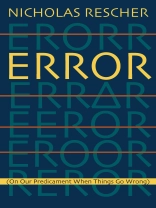In <i>Error, </i> Nicholas Rescher presents a fresh analysis of the occurrence, causality, and consequences of error in human thought, action, and evaluation. Rescher maintains that error-avoidance and truth-achievement are distinct but equally important factors for rational inquiry, and that error is inherent in the human cognitive process (to err is human). He defines three main categories of error: cognitive (failure to realize truths); practical (failure related to the objective of an action); and axiological (failure in evaluation), and articulates the factors that contribute to each. His discussion also provides a historical perspective on the treatment of error in Greek philosophy, and by later thinkers such as Aquinas, Descartes, Spinoza, Leibniz, James, Royce, Moore, and Russell. <i>Error</i> is an important reexamination of the significance of error to the fields of philosophical anthropology, epistemology, ontology, and theology. As Rescher's study argues, truth and error are inexorably intertwined—one cannot exist without the other. Error is an unavoidable occurrence in the cognitive process—without missteps on the path to truth, truth itself cannot be attained. The risk of error is inherent in the quest for truth.
เกี่ยวกับผู้แต่ง
<b>Nicholas Rescher</b> was Distinguished University Professor of Philosophy at the University of Pittsburgh and co-chairman of the Center for Philosophy of Science. A member of the American Academy of Arts and Sciences, he served as president of the Eastern Division of the American Philosophical Association, the Leibniz Society of North America, the Charles S. Peirce Society, the American Catholic Philosophical Association, and the Metaphysical Society of America. Rescher was the author or editor of more than one hundred books, including <i>Ignorance (On the Wider Implications of Deficient Knowledge), Philosophical Inquiries: An Introduction to Problems of Philosophy</i>, and <i>A Journey through Philosophy in 101 Anecdotes</i>.












